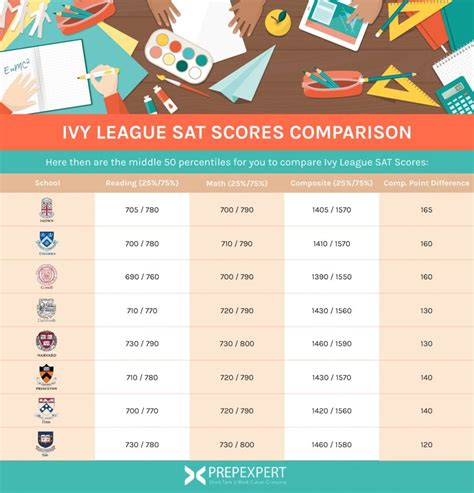As you embark on your college application journey, the SAT score looms large as a critical factor in the admissions process at Ivy League universities. Understanding the SAT score requirements and strategies for optimizing your performance is essential to maximize your chances of acceptance.

SAT Scores for Ivy League Universities
The SAT is a standardized test that measures your critical reading, math, and writing skills. Ivy League universities typically set high standards for SAT scores, making it a highly competitive aspect of the application.
According to the College Board, the average SAT score for students admitted to Ivy League universities in 2022 was 1520 out of a possible 1600. This indicates the rigorous expectations these institutions hold for their incoming class.
SAT Score Ranges for Ivy League Universities:
| University | SAT Score Range |
|---|---|
| Brown University | 1430-1520 |
| Columbia University | 1480-1570 |
| Cornell University | 1420-1510 |
| Dartmouth College | 1450-1550 |
| Harvard University | 1470-1580 |
| University of Pennsylvania | 1440-1530 |
| Princeton University | 1450-1550 |
| Yale University | 1480-1570 |
Importance of SAT Scores for Ivy League Admissions
SAT scores are a significant metric that Ivy League universities use to evaluate applicants. They provide a standardized measure of academic ability and achievement, which helps admissions officers compare candidates from diverse backgrounds and educational systems.
Strong SAT scores can enhance your application by demonstrating your academic rigor and potential for success in the demanding academic environment of Ivy League institutions. They can also indicate your ability to handle the high-level academic work that is characteristic of Ivy League universities.
Strategies for Optimizing Your SAT Score
Given the importance of SAT scores for Ivy League admissions, it is crucial to develop effective strategies for optimizing your performance on the test. Here are some key strategies:
1. Early Preparation:
Start preparing for the SAT early, ideally in your junior year of high school. This provides ample time to develop a comprehensive understanding of the SAT format, question types, and time management techniques.
2. Practice Regularly:
Consistent practice is vital for improving your SAT score. Take practice tests under timed conditions and analyze your results to identify areas for improvement. Utilize official SAT practice materials and online resources.
3. Focus on Math and Critical Reading:
Math and Critical Reading are the most heavily weighted sections of the SAT. Allocate significant time to improving your skills in these areas through targeted practice and problem-solving.
4. Improve Writing Skills:
While the Writing section is not as heavily weighted as Math and Critical Reading, it still plays a role in your overall score. Focus on developing strong writing skills and improving your ability to effectively communicate ideas in writing.
5. Time Management:
Time management is crucial on the SAT. Practice pacing yourself effectively and learn to allocate your time wisely during the test. It is important to develop strategies for skipping difficult questions and returning to them later.
Benefits of High SAT Scores for Ivy League Admissions
Achieving high SAT scores can provide several benefits in the Ivy League admissions process:
1. Increased Chances of Admission:
Strong SAT scores can improve your chances of being admitted to an Ivy League university. They serve as a powerful indicator of your academic ability and potential.
2. Enhanced Scholarship Opportunities:
Ivy League universities often offer generous scholarships to students with exceptional SAT scores. High scores can increase your eligibility for merit-based financial aid.
3. Competitive Edge:
In the highly competitive Ivy League admissions process, a high SAT score can give you an edge over other applicants. It can set you apart as a top candidate and increase your chances of being admitted to your dream school.
FAQs about SAT Scores for Ivy League
1. What is a good SAT score for Ivy League universities?
A good SAT score for Ivy League universities is typically in the range of 1450-1550. However, the specific score range may vary depending on the university you are applying to.
2. Can I get into an Ivy League university with a low SAT score?
It is possible to get into an Ivy League university with a low SAT score, but it is more difficult. Other factors, such as your GPA, extracurricular activities, and personal statement, will play a larger role in the admissions process.
3. How can I improve my chances of getting a high SAT score?
To improve your chances of getting a high SAT score, focus on early preparation, consistent practice, targeted studying, effective time management, and a positive mindset.
4. Are there any resources available to help me prepare for the SAT?
Yes, there are numerous resources available to help you prepare for the SAT, including official SAT practice materials, online courses, and tutoring services.
